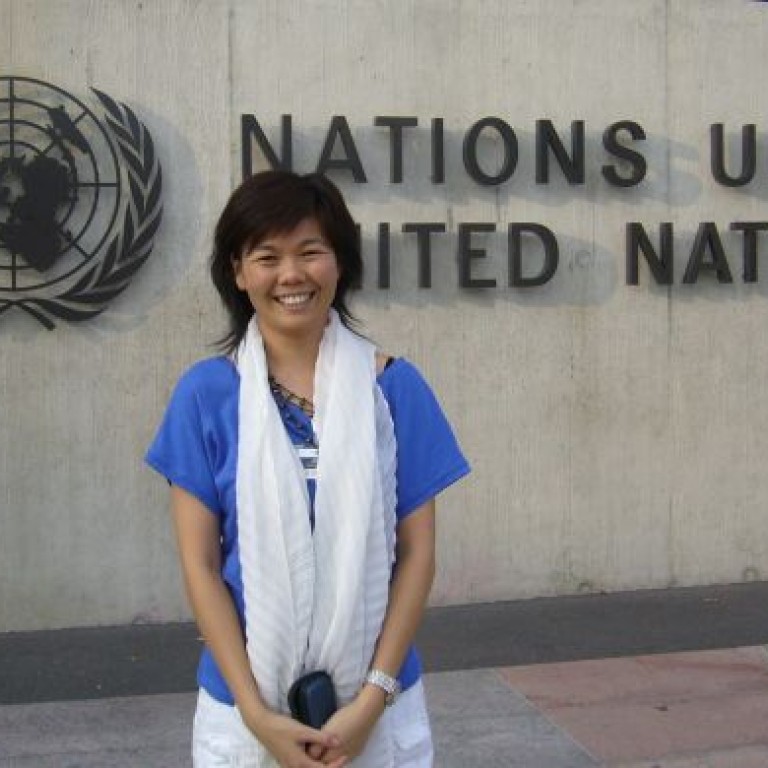
Fermi Wong
The founder of Unison Hong Kong, Fermi Wong has long stood on the front lines in the fight against racism in the city. Some officials regard her with scorn, while some citizens condemn her for helping “outsiders.” Despite the hostility, however, she never yields to pressure. Wong talks to Grace Tsoi about her worthwhile cause.
I started serving ethnic minorities in 1998. In 2001, I founded Unison Hong Kong. So I have been serving ethnic minorities for 14 years.
It was only by coincidence that I am now serving ethnic minorities. I was an outreach social worker and we would visit arcades and soccer fields. If underage children showed up at those venues at an inappropriate time, we would approach them.
I went to a soccer field in Sham Shui Po. Some children of ethnic minorities were playing at the side of the soccer field. I asked why they didn’t go onto the field to play properly. They replied, “Can we?” I later found out that the Chinese forbade them from playing on the field.
During another visit, some older children saw me. They told the younger kids to leave and said, “Hey, watch out! She’s Chinese!”
The situation is very different when you compare it with 10 years ago. In the past, ethnic minorities were invisible in terms of policymaking and daily encounters; nobody cared about them. It was complete indifference, which is the worst kind of discrimination.
However, the well-being of ethnic minorities—especially the working class—hasn’t improved that much. But I comfort myself with the thought that the antiracism movement is still a new concept in Hong Kong.
There has been more discussion [about racism] since the handover. Colonialism is a form of racial discrimination, and the colonial government did not tackle racial inequality in Hong Kong.
In 2003, Donald Tsang announced the population policy, which did not take ethnic minorities into account at all. The government assumed that all Hongkongers are Chinese. During a forum, I asked Siu Sin-por [now the head of the Central Policy Unit] about the projections and planning for the ethnic minority population. His mouth fell into an o-shape, saying that he forgot about them.
I heard it through the grapevine that some officials called me Miss No Friends, a bitch and a dangerous person. But a real dangerous person is someone who is in a position of power but holds a prejudice towards some groups in the community.
Some education officials said that they wouldn’t bother with Unison because it was as small as a mosquito. I admit that we are a small organization. But mosquitos can be very annoying. I am like a mosquito. I know I won’t make a lot of impact as I am up against huge machinery. But I remind the government of the existence of ethnic minorities.
For ethnic minorities, the biggest problem is education. It is a fundamental right. It is a solution to many social problems. It is a means for people to change their fates.
Only 1 percent of ethnic minority students go to university [in Hong Kong]. If 99 percent of people fail in this system, there must be some structural problems. The officials always say we have Nabela Qoser [a Cantonese-speaking TV reporter of Pakistani origin], so there are no problems with the education system. How can one successful case override all the failing cases?
I understand why the government does not do much for the education of ethnic minorities: it does a political impact assessment. Ethnic minorities are in the most disadvantaged position. It is a minority concern, and the unity among different races is not strong.
I was born on the mainland, and I understand the differences between Hong Kong and the mainland. I cherish Hong Kong’s uniqueness.
I was a curious child. Mao Zedong was like a deity, and I wondered whether he was even human. One day, I bombarded my mother with questions. Does Chairman Mao eat? What kind of food does he eat? My mother was so annoyed with me, so she told me that Chairman Mao ate dung.
I was shell-shocked, but I continued asking my mother whose dung Chairman Mao ate. She said Chairman Mao ate Premier Zhou Enlai’s dung.
I went to the ancestral hall, boastful of my great discovery. I asked the village elder if he knew what Chairman Mao ate. I told him he ate dung—the dung of Premier Zhou Enlai!
The next day, the villagers and elders visited my home and urged my mother to teach me properly. My mother kept apologizing.
As a mainland immigrant, I did have the experience of being discriminated against. People sneered at my Fujian accent. But I didn’t try to change it, because I think it’s okay as long as we can communicate.
Hongkongers are not so naïve that they believe in “one country, two systems” anymore. We are only trying to slow down Hong Kong’s turning into “one system.” [China] guaranteed that Hong Kong would remain unchanged for 50 years. Only 15 years have passed—it shows how impatient they are!

